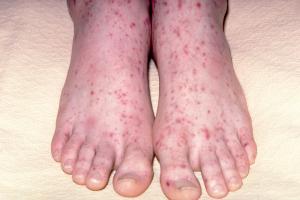Meningitis
Meningitis is an infection of the protective membranes (layers) that surround the brain and spinal cord. Meningitis can be serious if not treated quickly. Call 999 for an ambulance or go to your nearest emergency department if you think you or your child might be seriously ill.
Symptoms of meningitis
Meningitis can affect anyone, but is common in babies, young children, teenagers and young adults. Symptoms of meningitis develop suddenly and can include:
- a high temperature (fever) over 37.5C (99.5F)
- being sick
- a headache
- a blotchy rash that doesn't fade when a glass is rolled over it (this won't always develop)
- a stiff neck
- a dislike of bright lights
- drowsiness or unresponsiveness
- seizures (fits)
Babies may also:
- refuse feeds
- be agitated and not want to be picked up
- have a bulging soft spot on their head (fontanelle)
- be floppy or unresponsive
- have an unusual high-pitched cry
- have a stiff body
These symptoms can appear in any order and some may not appear.


When to get medical help
You should get medical advice as soon as possible if you're concerned that you or your child could have meningitis.
Trust your instincts and don't wait until a rash develops.
Call 999 for an ambulance or go to your nearest emergency department immediately if you think you or your child might be seriously ill.
Call your GP surgery or GP out of hours service for advice if you're not sure if it's anything serious or you think you may have been exposed to someone with meningitis.
How meningitis is spread
Meningitis is usually caused by a bacterial or viral infection. Bacterial meningitis is rarer but more serious than viral meningitis.
Infections that cause meningitis can be spread through:
- sneezing
- coughing
- kissing
- sharing cutlery and toothbrushes
Meningitis is usually caught from people who carry these viruses or bacteria in their nose or throat but aren't ill themselves. To be infected usually requires frequent or long periods of close contact.
It can also be caught from someone with meningitis, but this is less common.
Meningitis vaccinations
Meningitis can be caused by a number of different infections, so several vaccinations offer some protection against it.
Children should receive most of these as part of the vaccination schedule. Speak to your GP if you're not sure whether you or your child's vaccinations are up-to-date.
You can read more about vaccinations against meningitis in ‘more useful links’ section below.
Treatments for meningitis
People with suspected meningitis will usually have tests in hospital to confirm the diagnosis and check whether the condition is the result of a viral or bacterial infection.
Bacterial meningitis usually needs to be treated in hospital for at least a week.
Viral meningitis tends to get better on its own within 7 to 10 days. It can often be treated at home. Getting plenty of rest and taking painkillers and anti-sickness medication can help relieve the symptoms in the meantime.
Outlook for meningitis
Viral meningitis will usually get better on its own and rarely causes any long-term problems.
Most people with bacterial meningitis who are treated quickly will also make a full recovery, although some are left with serious, long-term problems. These can include:
- hearing loss or vision loss(external link opens in a new window / tab), which may be partial or total
- problems with memory and concentration
- recurrent seizures (epilepsy)
- co-ordination, movement and balance problems
- loss of limbs – amputation of affected limbs is sometimes necessary
Overall, it's estimated that up to 1 in every 10 cases of bacterial meningitis is fatal.
Find out more about meningitis on the NHS website.(external link opens in a new window / tab)
More useful links
- How to use your health services
- Teenage immunisations for ages 14 to 18(external link opens in a new window / tab)
- Meningococcal B (Men B) vaccination for babies
- Men ACWY vaccination for teenagers and students
The information on this page has been adapted from original content from the NHS website.
For further information see terms and conditions.